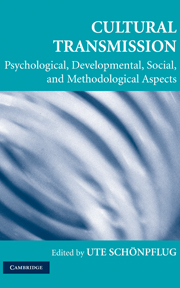Book contents
- Frontmatter
- Contents
- Foreword
- Contributors
- 1 Introduction to Cultural Transmission: Psychological, Developmental, Social, and Methodological Aspects
- 2 Theory and Research in Cultural Transmission: A Short History
- PART ONE EVOLUTIONARY PERSPECTIVE
- PART TWO CROSS-CULTURAL PERSPECTIVE
- PART THREE INTRACULTURAL VARIATIONS
- Index
- References
1 - Introduction to Cultural Transmission: Psychological, Developmental, Social, and Methodological Aspects
Published online by Cambridge University Press: 05 June 2012
- Frontmatter
- Contents
- Foreword
- Contributors
- 1 Introduction to Cultural Transmission: Psychological, Developmental, Social, and Methodological Aspects
- 2 Theory and Research in Cultural Transmission: A Short History
- PART ONE EVOLUTIONARY PERSPECTIVE
- PART TWO CROSS-CULTURAL PERSPECTIVE
- PART THREE INTRACULTURAL VARIATIONS
- Index
- References
Summary
Every view of life that becomes extinct, every culture that disappears, diminishes a possibility of life.
(Octavio Paz, 1978, Nobel Prize winner)INTRODUCTION
The topic of cultural transmission – according to its current meaning of a transfer process carrying cultural information from one generation to the next, and from one group to the next – has received increasing interest in many disciplines. This volume attempts to impart perspectives on cultural transmission, what is known and – more important for future research – which issues still have to be clarified. The topic has been elaborated and refined in various academic contexts in Europe and the United States. This first chapter provides an outline of the history of prominent issues of cultural transmission. This chapter and the following contributions may serve as sources for the various perspectives outlined in the literature.
This volume is based on a special issue of the Journal of Cross-Cultural Psychology published in 2001. Some of the authors were already included in the special issue, and all of those asked agreed to elaborate on their contributions for chapters of this edited book. All contributors felt that the topic called for more theory, more data, and more stringent interpretations. However, other contributions also were included to extend the range of perspectives and the range of countries with their particular cultural variations.
- Type
- Chapter
- Information
- Cultural TransmissionPsychological, Developmental, Social, and Methodological Aspects, pp. 1 - 8Publisher: Cambridge University PressPrint publication year: 2008
References
- 6
- Cited by



